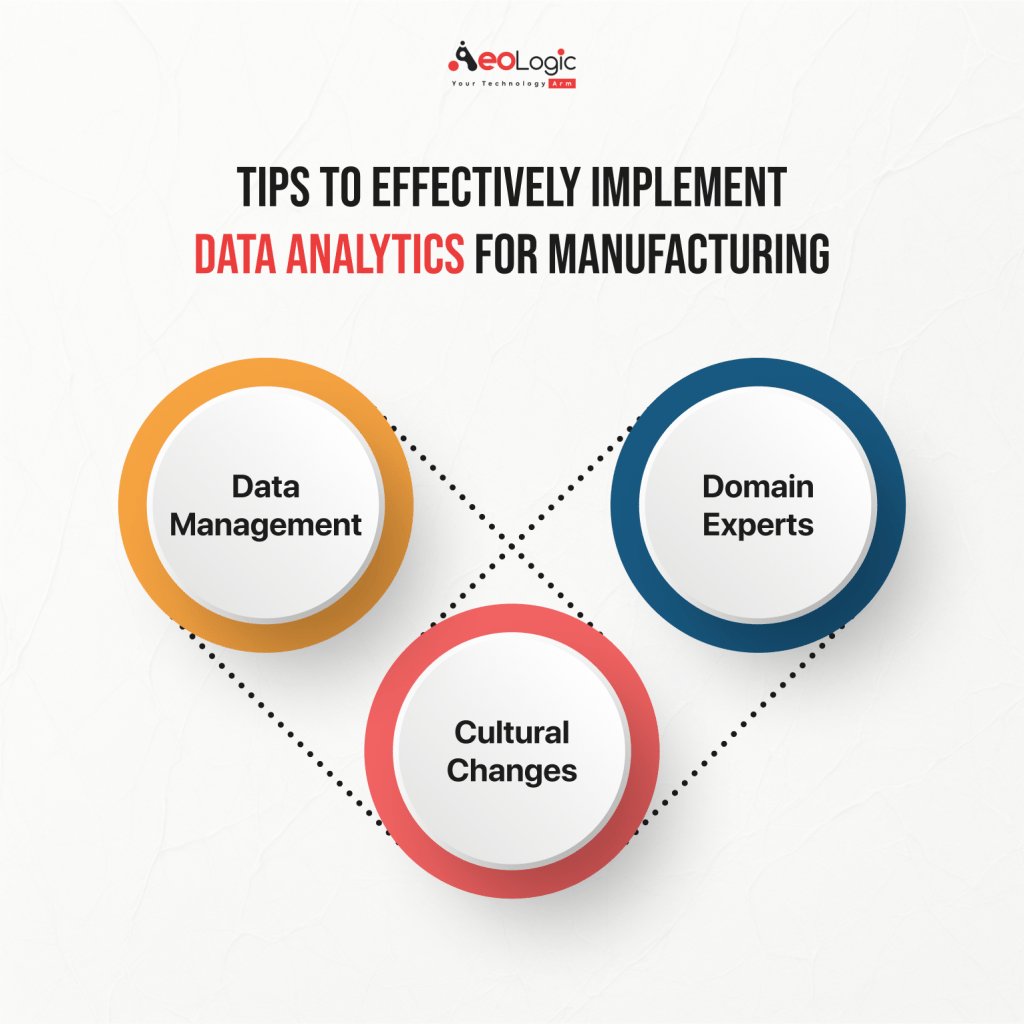In the last 20 years, firms have been able to reduce waste in manufacturing processes while improving product output and quality by implementing Six Sigma and Lean techniques. However, the dynamic nature of today’s manufacturing segment, particularly in the chemicals, pharmaceuticals, and mining industries, necessitates a more granular approach to discovering and fixing process problems. One such approach is the use of big data in manufacturing. And there are indications to support it. For example, the manufacturing sector’s worldwide big data market is expected to grow to $9.11 billion by 2026. This market growth has been greatly influenced by the technology’s application case. In this post, we will discuss the benefits and applications of industrial analytics. Learn how to make data-driven decisions and optimize your operations with us.
How Data Analytics Can Revolutionize the Manufacturing Industry?
Artificial intelligence, data analytics, and big data are extremely important technologies in manufacturing. It’s because firms in this field encounter issues like:
- Supply Chain Disruptions
- Quality Control Issues
- Changing client preferences.
- Ensuring adherence to regulatory requirements
- Managing and reducing operational costs
- Tackling disruptions in the supply chain
- Enhancing quality assurance processes
- Adapting to evolving customer demands
- Minimizing costly downtimes
- Preventing and detecting fraudulent activities
- Reducing the rate of customer attrition
Yes, data analytics can help in resolving the challenges outlined above. This is because it delivers insights that enable improved decision-making and more efficient procedures. As a result, manufacturers may better manage their budgets, make smarter decisions, and increase efficiency. As a result, more businesses are choosing to use off-the-shelf software. Others hire Scala developers to integrate data analytics into their own solutions.
Also Read: The Importance of Predictive Data Analytics in Agriculture
Data Analytics in Manufacturing: Benefits & Importance
Modern manufacturing entails a series of complicated activities, from raw material procurement to precisely matching production capacities with demand. Without the assistance of current data analysis, it is impossible to accurately determine where the opportunities are. Here are a few instances of how data analytics may help manufacturers reduce costs, enhance quality, and increase profitability.
Predictive Maintenance
One of the most interesting applications of data analytics in manufacturing is the ability to forecast when a vital piece of equipment will need to be removed from operation for repair or replacement. Tight production schedules do not account for unanticipated production disruptions. If a major piece of equipment malfunctions, a production line might be down for many days.
Predictive analytics may be used to evaluate massive volumes of historical data in order to better forecast when a piece of equipment requires maintenance or will break and how. This information allows you to have replacement components on hand before they are needed.
Predictive analytics can also help to pinpoint the fundamental cause of equipment failure. Data collected from onboard sensors can be used to identify potential stressors that cause industrial equipment to fail. This information may be utilized to rework the processes required to extend the life of critical components.
- Data Cloud for Dummies
- Cloud Data Lakes for Dummies
- Maximizing yield or throughput
Big data analysis solutions allows you to fully utilize each production asset. Yield-energy-throughput analytics sifts through massive volumes of data to reveal practical insights on how to optimize production processes to improve the efficiency and throughput of each piece of equipment. This form of study yields a more energy-efficient manufacturing process capable of increasing output.
Supply chain optimization
Smoothing out bumps (or earthquakes) in the supply chain keeps manufacturing plans on track, allowing for tight product delivery dates. Modern data analytics techniques may examine complicated data sets to proactively anticipate hazards like as bad weather occurrences, prospective logistical bottlenecks, or the approaching financial collapse of a critical raw material supplier. Being able to predict possible supply chain concerns helps firms to implement contingency plans to mitigate their impact on output.
Accurate Demand Estimates
Knowing which items will be required and when gives a competitive edge, allowing producers to correctly align production capacity with demand. Customer purchase data, weather patterns, raw material availability, and a variety of other factors may all be examined to better forecast what customers will need or desire in the future.
Warehouse Management
Data analytics for manufacturing can help to simplify warehouse operations. Data gathered from demand forecasting may be used to better plan for increasing workforce requirements during peak periods.
It can also help to improve the efficiency of warehouse operations and product fulfillment. Companies can use this information to find manual procedures that might be automated and to reveal regular trends in order fulfillment errors that need to be addressed.
Also Read: Monitoring Soil Health And Nutrient Levels With IoT Technology
Tips To Effectively Implement Data Analytics For Manufacturing

Making substantial advantages from factory analytics needs more than simply investing in a contemporary cloud data warehouse for manufacturing organizations. Of course, manufacturers want a data platform capable of ingesting and analyzing complex industrial data inputs in real time, but they must also ensure that domain experts can participate, as valuable insights rely on their domain knowledge. Here are three key points to consider before launching a data analytics effort.
Data Management
Advanced analytics on data collected from industrial activities is a challenging procedure. For this reason, businesses require a contemporary data management system that establishes a single source of truth and standardizes data availability. Companies must plan how they will manage the data lifecycle, including best practices for data transformation and the integration of structured and semi-structured data.
Including Domain Experts
For any data analytics effort to be relevant, domain-level experts must be consulted. These experts have a thorough awareness of essential parts of the manufacturing process, such as equipment maintenance, supply chain management, and process technology, as well as the data that goes with them. Domain specialists assist data scientists with domain-specific information to guarantee that the data analysis produces relevant and correct results.
Process and Cultural Changes
Adopting a data-driven operational emphasis is a huge culture shift for most businesses. A successful analytics program involves buy-in from everyone, from the C-suite to the manufacturing floor. A new method will not be effective unless all stakeholders are adequately educated on their roles in implementation, any adjustments that may be necessary, and how it will benefit everyone.
Also Read: How IoT Technologies benefits Agriculture all over World
Final Words
Now you are aware that data analytics is important for manufacturing. It helps solve problems like managing costs, improving quality, and handling supply chain issues. By using data analytics, manufacturers can work in better way.
It tend to follow regulations, and meet customer needs. Finally it leads to better decision making and staying competitive in the market.

I’m Deepika Pandey, an SEO strategist and content writer with 6+ years of experience. I create SEO-friendly content that drives traffic and engages readers. I combine data insights with creativity to help businesses grow their online presence effectively.






